The Works of Jonathan Edwards | WJE (41 vols.)
Digital Logos Edition
Jonathan Edwards has left an indelible impression on nearly 300 years of theological scholarship. This massive collection from Yale University Press totals over 24,000 pages—the most comprehensive archive of Edwards’ treatises, sermons, letters, musings, and previously unpublished works ever assembled. With critical introductions by noted Edwards scholars, it provides the latest contemporary analysis, commentary, and reflection on Edwards life, thought, and literary sources. Gain new appreciation of the historical context of his works, the nature and purpose of his writings, and their initial critical reception. This Yale edition is the standard set of Edwards’ Works. With unsurpassed scholarship, content, and usability, it is unprecedented in sheer volume and value.

- Collects Edwards’ treatises, letters, sermons, and more into the the most comprehensive collection of his works ever assembled
- Contains introductions, appendixes, and indexes
- Provides insight into American religious thought
One measure of [Edwards’] greatness is Yale University Press’ critical edition of his works.
—Gerald R. McDermott, United Press International
The Works of Jonathan Edwards . . . is the premier scholarly editorial project in American intellectual history.
—Allen C. Guelzo, Christian Century
Excellent and welcome additions to the growing body of scholarship on a figure who is America’s foremost theologian to date and one who also stands shoulder to shoulder with the likes of Augustine, Aquinas, Luther, and Calvin.
—W. Stacy Johnson, Interpretation
- Title: The Works of Jonathan Edwards
- Publisher: Yale University Press
- Volumes: 41
- Resources: 28
- Pages: 24,029
- Format: Logos Research Edition
- Christian Group: Reformed
- Resource Type: Collected Works
- Topic: Theology, Biblical Studies, Sermons, Philosophy
- Resource ID: {10A4E2F1-FE57-4A12-BABA-8DD7C1208A50}
- The Works of Jonathan Edwards, vol. 1: Freedom of the Will
- The Works of Jonathan Edwards, vol. 2: Religious Affections
- The Works of Jonathan Edwards, vol. 3: Original Sin
- The Works of Jonathan Edwards, vol. 4: The Great Awakening
- The Works of Jonathan Edwards, vol. 5: Apocalyptic Writings
- The Works of Jonathan Edwards, vol. 6: Scientific and Philosophical Writings
- The Works of Jonathan Edwards, vol. 7: The Life of David Brainerd
- The Works of Jonathan Edwards, vol. 8: Ethical Writings
- The Works of Jonathan Edwards, vol. 9: A History of the Work of Redemption
- The Works of Jonathan Edwards, vol. 10: Sermon and Discourses, 1720–1723
- The Works of Jonathan Edwards, vol. 11: Typological Writings
- The Works of Jonathan Edwards, vol. 12: Ecclesiastical Writings
- The Works of Jonathan Edwards, vol. 13: The "Miscellanies", a–500
- The Works of Jonathan Edwards, vol. 14: Sermons and Discourses, 1723–1729
- The Works of Jonathan Edwards, vol. 15: Notes on Scripture
- The Works of Jonathan Edwards, vol. 16: Letters and Personal Writings
- The Works of Jonathan Edwards, vol. 17: Sermons and Discourses, 1730–1733
- The Works of Jonathan Edwards, vol. 18: The "Miscellanies", 501–832
- The Works of Jonathan Edwards, vol. 19: Sermons and Discourses, 1734–1738
- The Works of Jonathan Edwards, vol. 20: The "Miscellanies", 833–1152
- The Works of Jonathan Edwards, vol. 21: Writings on the Trinity, Grace, and Faith
- The Works of Jonathan Edwards, vol. 22: Sermons and Discourses, 1739–1742
- The Works of Jonathan Edwards, vol. 23: The "Miscellanies", 1153–1360
- The Works of Jonathan Edwards, vol. 24, Part 1&2: The "Blank Bible"
- The Works of Jonathan Edwards, vol. 25: Sermons and Discourses, 1743–1758
- The Works of Jonathan Edwards, vol. 26: Catalogues of Books
- More Works of Jonathan Edwards: The Controversies Notebook
- More Works of Jonathan Edwards: Harmony of the Scripture: Notes and Drafts
- More Works of Jonathan Edwards: Preparatory Notes for Later Works
- More Works of Jonathan Edwards: Theological Notes and Controversies
- More Works of Jonathan Edwards: Legal Documents
- More Works of Jonathan Edwards: Speeches
- More Works of Jonathan Edwards: Catechisms and Examinations
- More Works of Jonathan Edwards: Sermons: 1720–1723
- More Works of Jonathan Edwards: Sermons: 1723–1726
- More Works of Jonathan Edwards: Sermons: 1727–1728
- More Works of Jonathan Edwards: Sermons: 1728–1729
- More Works of Jonathan Edwards: Sermons: 1729–1730
- More Works of Jonathan Edwards: Sermons: 1730–1731
- More Works of Jonathan Edwards: Sermons: 1746
- More Works of Jonathan Edwards: Sermons: 1747
This title is included in the following collections
You can save when you purchase this product as part of a collection.
Jonathan Edwards: Life, Though...
$1,149.99$1,149.99Logos 8 Reformed Platinum Lega...
$1,499.99$1,499.99Logos 8 Reformed Diamond Legac...
$2,999.99$2,999.99Logos 7 Reformed Diamond Legac...
$2,999.99$2,999.99
- $2,999.99
- $7,698.39$4,599.99
- $4,749.99
- $4,749.99
- $4,749.99
- $4,749.99
- $21,749.99
- $23,999.99
- $24,999.99
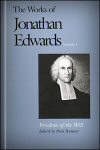
This inaugural volume in The Works of Jonathan Edwards is his major contribution to theology and stands as a leading document on Calvinist thought. Mr. Ramsey’s introduction provides a fresh analysis of Edwards’ theological position, includes a study of his life and the intellectual issues in the America of his time, and examines the problem of free will in the philosophical context of today and in connection with Leibniz, Locke, and Hume.
Ever since his own day Jonathan Edwards has been a man more talked about than read. This distinguished edition, which Paul Ramsey has so admirably inaugurated, gives him a new chance, not only to be admired afresh but to be given a seat at the symposium table. No eighteenth-century American deserves such recall more fittingly.
—American Literature
If the volumes to follow adhere to the standard set by Paul Ramsey in the first, Edwards will have achieved the monument he deserves.
—New York Times
The publication of this handsome volume, the first in an important series, should be applauded by all students of American history, literature, philosophy, and theology.
—Indiana Magazine of History
It is hard to find things to criticize in this splendid edition. . . . The editor, the committee, and the press are to be congratulated on this impressive first volume of the much-needed definitive and complete Edwards.
—Union Seminary Quarterly
I cannot do other than stress admiration for the quality of both the introducing and editing of this book by Prof. Ramsey.
—Basil Hall, Theology
Paul Ramsey was Paine Professor of Religion at Princeton.
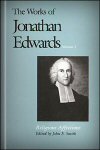
This volume contains Edwards’ most mature and persistent attempt to judge the validity of the religious development in eighteenth-century America known as the Great Awakening. In developing criteria for such judgment he attacked at the same time one of the fundamental questions facing all religion: how to distinguish genuine from spurious piety? The Awakening created much bitter controversy; on the one side stood the emotionalists and enthusiasts, and on the other the rationalists, for whom religion was essentially a matter of morality or good conduct and the acceptance of properly formulated doctrine. Edwards, with great analytical skill and enormous biblical learning, showed that both sides were in the wrong. He attacked both a “lifeless morality” as too pale as to be the essence of religion, and he rejected the excesses of a purely emotional religion more concerned for sensational effects than for the inner transformation of the self, which was, for him, the center of genuine Christianity.
Any modern empirical philosopher should welcome this sane, balanced, and acute study of the signs of a truly converted life. It is valuable to be reminded that not all the varieties of religious experience are experiences of true religion.
—Journal of Theological Studies
Mr. Smith's introduction is an enlightening volume in itself and excellently shaped toward the understanding of the treatise it introduces. It may well stimulate inquiry as to the continuing relevance of Edwards' thought to the religious dilemma of modern times.
—American Literature
This volume, like its predecessor, is magnificently produced and carefully edited. The editor . . . provides over eighty pages of an introduction which shows a profound and erudite analysis of Edwards’ treatment of the question, 'How shall the presence of the divine Spirit be discerned against the background of the Great Awakening in New England?', and contrives to give it a contemporary relevance.
—Theology
A splendid piece of interpretation, exegetical and contemporary.
—Church History
John E. Smith was Emeritus Professor of Philosophy at Yale University.
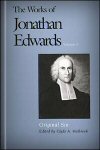
The controversy over human deprivation which raged throughout the eighteenth century was no mere intramural squabble among theologians but an important phase of the evolution in Western man’s estimate of his nature and potentialities. By the time Jonathan Edwards entered the lists to champion the hated doctrine of original sin, he saw himself as not only defending a particular dogma but also combating an increasingly dominant drift of opinion which had already engulfed much of Europe and was encroaching dangerously upon America.
John Taylor’s treatise was perhaps the boldest and most impressive assault on the doctrine which more than any other contradicted the Enlightenment view of man, and it haunted Edwards throughout all the pressing duties and personal hardships of the years just before and during his sojourn at Stockbridge. Ultimately, he was able to develop a thorough rebuttal of Taylor which focused on three major issues: the fact and nature of original sin, its cause and transmission, and God’s responsibility for man’s sinfulness.
First published in 1758, The Great Christian Doctrine of Original Sin Defended went though at least thirteen separate editions and was included in all collected editions of Edwards’ works. The text of the first edition has now been brought into accord with the principles of the Yale edition, making full use of all relevant manuscript materials. Mr. Holbrook’s comprehensive introduction and annotations provide detailed information about the sources, development, and reception of the work.
Clyde A. Holbrook was William H. Danforth Professor of Religion at Oberlin College.
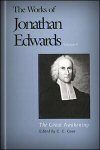
Interpreting the Great Awakening of the eighteenth century was in large part the work of Jonathan Edwards—whose writings on the subject defined the revival tradition in America. Moving from sensitive descriptions of "the surprising work of God" in conversion to a consuming quest for the essence of true religion, and threading his way through mounting controversies over "errors in doctrine and disorders in practice," Edwards sought to locate an authentic core of evangelical experience, to define it in terms of biblical faith and psychological insight, and to defend it against both overheated zealous and rationalistic critics. The tracts that unfold his thoughts, presented here (with related correspondence) for the first time in accurate critical texts, document a movement so significant for the American character that it has been called "our national conversion."
In a carefully researched introduction, C. C. Goen identifies the "Arminian threat" to which the Northampton pastor responded at the onset of the Awakening, and traces Edwards’ understanding of vital religion as it developed in the ambiguous context of revivalism. Mr. Goen’s study also illuminates little-known aspects of A Faithful Narrative and describes the haphazard way in which that important work reached its eager audience.
C. C. Goen, author of Revivalism and Separatism in New England, 1740–1800, was Professor of Church History at the Wesley Theological Seminary in Washington, D.C.
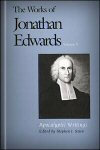
This edition presents the first text of Jonathan Edwards’ private commentary on the book of Revelation. Written over a period of thirty-five years, Edwards’ notebook reveals his lifelong fascination with apocalyptic speculation—including its bizarre aspects—and his persistent conviction concerning the usefulness of the visions in the life of the Christian church.
In this volume is also published the first complete edition (since the eighteenth century) of the Humble Attempt (1748)—the call for united prayer that was Edwards’ response to the decline in religious fervor after the Great Awakening. In his introduction and commentary, Stephen J. Stein examines the development of Edwards’ apocalyptic interests in light of the situation in the eighteenth century, showing also how Edwards’ private judgments on the book of Revelation affected his personal and theological activity. Together the texts and the introduction illuminate a hitherto inadequately explored facet of Edwards’ religious thought.
With this volume, the Yale edition of the Works of Jonathan Edwards inaugurates the publication of Edwards’ major manuscripts. Here, and in subsequent volumes, the massive body of Edwards’ manuscripts materials (including letters, sermons, and Miscellanies) will be made available for the first time.
This is an invaluable study. It provides fresh insight into another aspect of the theology of Jonathan Edwards in a new edition of his works. It provides materials which can be utilized in the studies of the millennial concepts in American colonial religion. We are indebted to Professor Stein for his work in compiling this helpful volume.
—Bill J. Leonard, Review and Expositor
[This volume is] learnedly and effectively edited, with ample introductions, notes, and appendices.
—American Literature
It would be difficult to exaggerate Stein's diligence, thoroughness, and prodigious scholarship.
—Edwin S. Gaustad, Journal of American History
One simply must assume that every academic library has a standing order for the Yale edition of Jonathan Edwards. . . . This fifth volume provides us with the authentic text of Edwards' An Humble Attempt . . . and supplies also his "Notes on the Apocalypse," which is the first of many manuscripts to appear in print. . . . the book can serve undergraduate and scholar alike.
—Choice
As a commentary on Revelation, Edwards' notebook offers a mixture of useful insights and quaint anachronisms. As a source for understanding the profound impact of biblical eschatology upon American theology and American self-understanding in colonial times, this book is rich indeed.
—Interpretation
Edwards' thorough and continuous dipping into the well springs of apocalyptic speculation further confirms the importance of this mode of thinking for the study of American history and religion as noted forty years ago by H. Richard Niebuhr in The Kingdom of God in America. This volume helps form an important chapter in the ongoing revision of Edwardsian scholarship.
—Rodney L. Petersen, The Princeton Seminary Bulletin
This is a superbly prepared, definitive volume that will be appreciated by Edwards scholars for years to come.
—Religious Studies
Stephen J. Stein is Chancellors’ Professor of Religious Studies and Chair of the Department of Religious Studies at Indiana University.
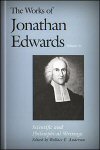
This volume contains two major manuscript notebooks of Jonathan Edwards—"Natural Philosophy" and "The Mind"—as well as a number of shorter manuscript writings connected with his scientific interests and philosophical development. Several of the shorter papers have not previously been published, notably Edwards’ letter on the "flying" spider (hither known only in a draft version), an essay on light rays, and a brief but important set of philosophical notes written near the end of his life. Wherever possible the works have been newly transcribed from manuscript originals. Wallace Anderson has collected, edited, and presented them here in a thoroughly authentic and readable text.
Each of the major works in this volume and each group of related writings are preceded by detailed discussion of manuscript sources and dates. In his introduction, Anderson makes these the basis for a revised account of the chronology of Edwards’ early writings and a deeper investigation of their biographical and historical context. Also included in the introduction are a new appraisal of Edwards’ efforts and achievements in science and an analysis of the developmental of his philosophical views. Anderson concludes from his research that Edwards was an enthusiastic—though untrained—investigator in the Newtonian tradition and that he grappled with the major metaphysical problems raised by this tradition. The papers reveal with special clarity the fertile and inquiring mind of our leading eighteenth-century philosopher-theologian.
Wallace E. Anderson was Associate Professor of Philosophy at Ohio State University.
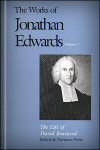
Edwards’ Life of David Brainerd is a rare, almost forgotten document depicting life in pre-Revolutionary America during the period when religious enthusiasm swept the colonial frontier. From 1743 to 1747 Brainerd had been a missionary to the Indians. Riding alone, thousands of miles on horseback, he kept a journal of daily events that he continued until the week before he died, at the age of twenty-nine, in Edwards’ house.
Published in 1749, the Life of Brainerd became a spiritual classic in its own time. As the first popular biography to be published in America, it went through numerous editions and has been reprinted more frequently than has any other of Edwards’ works. But what has not until now been known is that Edwards made drastic alterations in the original text. He shaped the narrative events to fit his own needs, presenting Brainerd as an example of a man who by example and deed opposed the rationalist, Arminian stance. Because the Yale edition is the first to print that portion of Brainerd’s manuscript that survives, set in parallel columns with Edwards’ text, these alterations can readily be discerned.
This edition of The Life of David Brainerd, the first complete, fully annotated edition ever to be compiled, includes related correspondence as well as an endpaper map of Brainerd’s travels. The editor’s introduction describes the place of Brainerd’s diary in Edwards’ life and thought, and provides ample historical background.
This handsomely produced book calls for close attention by the serious Brainerd student. . . . [Pettit’s] meticulous research has opened up fields of thought and new information not found in popular editions of the Diary, including unpublished material and related correspondence.
—Arthur Bennett, Churchman
A classic narrative of religious experience. . . . Pettit’s excellent introductory essay provides a vivid account of Brainerd’s relationship to the Awakening, his expulsion from Yale, and his labors as a missionary to the Indians.
—James H. Moorhead, Religious Studies Review
Another potent reminder of the wide-ranging interests of this eighteenth century Calvinist theologian. . . . Much of this material has never been published before, so it will no doubt add significantly to a more accurate portrait of Edwards and promote additional studies of religious and philosophical thought in eighteenth century New England.
—Helen Westra, Calvin Theological Journal
A welcome opportunity to reassess the spiritual state of British America and the work of one of its major participants and commentators. . . . For all interested in [British America] and in [its] preoccupations, this volume is essential reading.
—Colin Brooks, Journal of Ecclesiastical History
Pettit evinces an immense historical understanding not only of what is recoverable of Brainerd’s personal history, but also of the historical context of his time at Yale, the circumstances (and the personalities) involved in his expulsion, the evangelists outside the College who played their own role in this expulsion, the ministers who played a part in convincing him to become a missionary, and the international context of missionary activity at the time.
—Teresa Toulouse, Resources for American Literary Study
Norman Pettit is Emeritus Professor of English at Boston University.
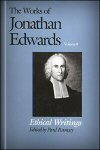
This volume contains two major works of Jonathan Edwards: an unpublished text of a series of sermons he preached in 1738, known as Charity and Its Fruits, and his Two Dissertations: I. Concerning the End for Which God Created the World and II. On the Nature of True Virtue, published posthumously in 1765. Together these writings set out the principles of Edwards’ ethical reflections.
The text of the sermon series is drawn from three sources. The primary text is an early nineteenth-century transcription of Edwards’ sermon booklets now in the Andover-Newton Theological School’s collection. Passages published in Tyron Edwards’ 1852 edition, and partial transcriptions by Joseph Bellamy found in three fragments among his papers, have been used where the Andover copy is incomplete. The Bellamy fragments are reproduced in their entirety in a critical appendix, along with examples showing the editor’s use of the three sources in construing this definitive text for the Yale edition.
End of Creation and True Virtue, intended by Edwards to be read together, are shown here to be closely related to Edwards’ other writings. Paul Ramsey’s introduction points out that Edwards returned again and again to these topics in his Miscellanies, where he identifies penultimate versions of both treatises and traces the development of Edwards’ ideas. Thus the reader is able to follow Edwards’ most profound reflections about God and the moral dimensions of his creations.
This is one of the most wide-ranging theological and philosophical volumes projected in the Yale edition. The Editor’s introduction gives a systematic analysis of the theological ethics to be found in these writings and of Edwards’ esteem for the splendor of common morality. Appendices exploring the “moral sense” school, “infused” virtue in Edwards and Calvin, and Edwards’ belief in the never ending increase of holiness and happiness in heaven complete the volume.
"Ramsey’s own contributions, including an extensive introduction and several appendices, are themselves of book length, with lucid discussions of textual issues, highly insightful interpretive comments on the main themes of Edwards’ moral thought, and an army of footnotes. . . . The volume as a whole is a substantial and distinguished contribution to the literature. . . . Students both of ethics and of Edwards will long be deeply grateful to Ramsey for this fine volume; and those who agree with Perry Miller that nobody better than Edwards generalized his experience into 'the meaning of America' will be glad to learn that in Ramsey’s hands Jonathan Edwards still has a lot to teach.
—Robert Song, Studies in Christian Ethics
One is grateful for Ramsey’s edition. His interpretations will enter the discussions that continue about Edwards’ work. His careful editing will be consulted by readers who use the cheaper reprints of nineteenth-century editions. His work on Edwards marks an unusual scholarly career; rarely has an American theologian combined voluminous systematic and polemical publications in his own voice with such disinterested and intricate scholarly endeavors as this volume and his earlier one . . . manifest.
—James M. Gustafson, Journal of Religion
. . . Ramsey provides an extensive introduction in which he argues, among other things, that the sermons on Christian charity are usefully read in conjunction with A Treatise Concerning Religious Affections and that the relationship between the two dissertations is sufficiently important that to read the one without the other will often be to misread Edwards’ ethical work. Every serious student of Edwards’ work, particularly his ethical work, will want to own this volume.
—Paul Lauritzen, Religious Studies Review
Prefaced by a[n] . . . illuminating introduction. . . . This volume will contribute to the renaissance in interest that Edwards deserves.
—Stanley J. Grenz, Christian Century
Paul Ramsey was Paine Professor of Religion at Princeton.
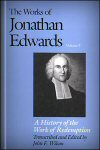
In 1739 Jonathan Edwards preached a series of thirty sermons in his church at Northampton, Massachusetts—sermons based on one scriptural passage: Isaiah 51:8. Apparently Edwards later intended to develop this discourse into a major treatise construing God’s redemption of the world as the most basic doctrine of theology. Unfortunately, he died before he could undertake this project. The sermon series, however, was later transcribed and then published in Edinburgh in 1774. There were numerous editions in Britain and the United States, and it was enormously influential in popular evangelical circles of the nineteenth century. This edition presents a modern, authoritative text that firmly establishes the place of Work of Redemption in the literary and historical tradition of puritan New England.
The text is based upon a new transcription of the original preaching booklets in which Edwards wrote out his sermons. In this sense, it restores an earlier and more authentic, if less polished, version of the work than the one that was edited and issued after Edwards’ death. As a critical edition it presents Edwards’ Redemption Discourse for the modern reader with appropriate annotations and references.
This volume includes a substantial introduction that places the composition of the sermons in the context of the period and discusses the reception and influence of the many editions of the published version. The introduction also interprets the place of this particular work in Edwards’ thought more generally, de-emphasizing the historical interests he has been alleged to have shown in it and emphasizing instead the ambitious theological program which it represented. Accordingly, this volume presents this major treatise in a fresh light and suggests new lines of inter-connection with other elements of his work.
In reading the discourses we not only learn of [Edwards’] theology of redemption, but also his use of Scripture, the structure of his sermons, and his concern for virtue. Like all the books in this fine series, this new edition of The Work of Redemption is an outstanding contribution to studies in Puritan theology, homiletics and history.
—Bill J. Leonard, Review and Expositor
John F. Wilson has joined a distinguished company of editors with this transcription of a series. . . . Once readers enter the Edwardean labyrinth, they will find wonders on every page.
—Christian Century
Unlike previous publications, the sermons are here preserved in their original unedited form; for the first time, readers have secondary access to the booklets Edwards carried into the pulpit, photographs of which are included in the volume. . . . Like previous volumes in Yale’s Edwards’ Works, this volume earns its rightful place as the standard scholarly source for students of Edwards and eighteenth-century religious history.
—John R. Fitzmier, Religious Studies Review
John F. Wilson is Emeritus Agate Brown and George L. Collord Professor of Religion at Princeton University.
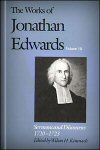
This volume presents the complete texts of twenty-three sermons preached by Jonathan Edwards during the first years of his career. The sermons, which have never been printed before, document one of the least explored periods of this eminent theologian's life and thought. Fully annotated, they are accompanied by an editor's preface that combines new information with fresh readings of related texts, such as the "Diary" and "Personal Narrative."
The volume includes a general introduction that puts Edwards' thirty-five years of writing and preaching into a broad literary and historical context. Based on the study of his entire sermon corpus—including over seventy printed sermons and twelve hundred sermon manuscripts—as well as related notebooks, letters, and treatises, the introduction enables readers to understand the elaborate network of working papers through which Edwards evolved his thought, as well as the critical function of the sermon in testing and developing expression of that thought. The introduction also explores the literary context of Edwards' writing, especially relating to the theory and practice of homiletics.
The sermons . . . are models of unobtrusive, intelligent editing. . . . That this edition is scrupulous and thorough testifies to Kimnach's quarter century of devoted scholarship; that it is graceful and generous only enhances his already considerable achievement.
—M. X. Lesser, The New England Quarterly
Wilson H. Kimnach is Emeritus Presidential Professor in the Humanities at the University of Bridgeport. He has been associated with the editorial committee of The Works of Jonathan Edwards, based at Yale University, for more than twenty years.
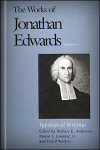
This volume presents for the first time a comprehensive, readable, and annotated text of the key typological notebooks of Jonathan Edwards: "Images of Divine Things," "Types Notebook," and Miscellany 1069, "Types of the Messiah." These three works illustrate the way the eminent eighteenth-century theologian developed his theory of typological exegesis, a theory that helped him to understand the relationship between the Old and New Testaments and to comprehend the correspondence between the natural and the spiritual worlds.
Edwards' theories of typology have long fascinated scholars from a variety of fields and have dominated literary studies of his work. These documents illuminate Edwards' epistemology and show clearly his involvement in contemporary philosophical and exegetical trends. Introductions to the documents place Edwards' typology within the context of his period, describe his typological practices, clarify some of the complex problems posed by his ambiguous use of the types throughout his career, and discuss his philosophical defenses of typologizing against the claims of materialists, deists, and rationalists.
The reader will appreciate the painstaking efforts at thoroughness and accuracy in regard both to the manuscripts and to the theological and historical context of Edwards' argument. . . . This volume shows the development of [his] thought and his articulation of a systematic defense of what he saw as the intimate relationship between Scripture, history, and nature.
—Christopher J. Viscardi, S.J., Theological Studies
Wallace E. Anderson was Associate Professor of Philosophy at The Ohio State University and Editor of Jonathan Edwards' Scientific and Philosophical Writings, the sixth volume in The Works of Jonathan Edwards.
Mason I. Lowance, Jr., is Professor of English at the University of Massachusetts, Amherst.
David H. Watters is Professor of English at the University of New Hampshire.
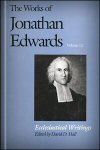
This volume includes four documents by Jonathan Edwards on the nature of the church, documents that reveal his views on ecclesiology, congregational autonomy, ordination, and admission to church membership and to the sacraments. The first document, reprinted here for the first time since the eighteenth century, is Edwards' defense of his fellow Hampshire County ministers in the Robert Breck controversy of 1735–36. The other three documents relate to Edwards' efforts to restrict admission to the sacraments at Northampton in 1749–50, actions that ultimately led to his dismissal as pastor: An Humble Inquiry explicates his reasons for refuting his grandfather and predecessor Solomon Stoddard's open admission policy; Misrepresentations Corrected is Edwards' response to his cousin Solomon Williams' criticisms of the Humble Inquiry; and Edwards' untitled narrative, available before only in Sereno Dwight's 1829 edition and here newly re-edited, gives details of his final conflict with his Northampton congregation.
The general introduction by David D. Hall places these writings in their contemporary polemical contexts and locates Edwards in a historical framework that highlights his Puritan, congregational heritage and the tensions between lay and clerical piety. It also provides an important reassessment of Edwards' relationship to Stoddard in the light of Edwards' experience during and after the Great Awakening.
A splendid contribution to the ongoing publication of what is the most important series ever to appear in print for an American religious thinker. . . . [Hall] has illuminated not only the mind of Edwards but also the lives, hopes, and expectations of the lay people to whom Edwards ministered.
—Mark A. Noll, William and Mary Quarterly
In the breadth of vision and learning in his introduction—Hall maintains the high standards that have distinguished the Yale edition of Edward's writings. This is one more commendable volume in that series.
—E. Brooks Holifield, Church History
Hall's introduction is a clear and insightful guide to one of the most puzzling episodes in American religious history: Northampton's 1750 dismissal of Edwards.
—Gerald R. McDermott, Religious Studies Review
David D. Hall is Professor of American Religious History at Harvard University. From 1989 to 2008 he was Bartlett Professor of New England Church History.
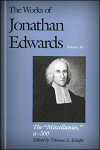
This book begins the publication of Jonathan Edwards' personal theological notebooks, called collectively the "Miscellanies." The entries in Volume 13 span the early years of Edwards' ministry (1722–1731) and range widely in subject matter. They record Edwards' initial thoughts on some of his most characteristic ideas, such as original sin, free will, the Trinity and God's end in creation. However, many entries relate to doctrinal and polemical subjects not included in the corpus of Edwards' published writings. The volume also contains Edwards' own alphabetical index to the entire "Miscellanies"; this "Table" is a theological document in its own right that reveals the interrelationship among the various components of Edwards' theological system.
The editor's introduction includes an interpretive essay that relates Edwards' growing body of entries in the "Miscellanies" to the main events in his life and progressing career. It also explores how even before the beginning of his tutorship at Yale in 1724 Edwards had developed both within and outside of the "Miscellanies" certain fundamental positions that constitute the truly distinctive elements in his theology. The introduction ends with an explanation of the methodology used to establish for the first time the chronology of the early Miscellanies. The conclusions of this research are summarized in a comprehensive chronological chart that locates by date not only entry nos. a-500, but also the sermons, essays and other manuscripts Edwards composed prior to 1731.
Edwardseans will find much here that will certainly contribute to a fuller understanding of Edwards' thought. . . . With this volume, the venerable Edwards edition reaches a new phase. The private Edwards, the imaginative, reflective intellect steeped in his metaphysical subject matter, now appears. The result is that we now have a richer and more complex picture of this important colonial American thinker and writer.
—Sargent Bush, Jr., Documentary Editing
Schafer's introduction is studded with stunning observations that come from a lifetime of immersion in these texts. Recommended especially for seminary and graduate libraries.
—Gerald R. McDermott, Religious Studies Review
Thomas A. Schafer is Emeritus Professor of Church History, McCormick Theological Seminary, Chicago.
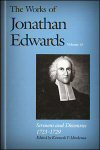
This book presents previously unpublished manuscript sermons from a crucial yet little-known period in Edwards' life: the years between the completion of his Master's degree at Yale College and the death of Solomon Stoddard, his famous grandfather and predecessor at Northampton, Massachusetts. These sermons, constituting the second in a projected series of six sermon volumes, highlight the intellectual and professional development of the young Edwards through his pastorate at Bolton, Connecticut, his Yale tutorship, and his colleagueship at Northampton.
In his introduction, Kenneth P. Minkema weaves together the details of Edwards' emerging career with the concerns expressed in the sermons. He shows how Edwards addressed local and provincial concerns as well as the great theological debates of his day, and how he struggled to work out the implications of his innovative concept of "excellency" and to develop his definition of conversion as a "spiritual light."
From these sermons emerges an unparalleled portrait of a rapidly maturing Edwards seeking to give shape to his theological vision.
The collection is essential for students of Edwards and his times.
—Gordon S. Wakefield, Theological Book Review
Each sermon in the volume proceeds from a mind and pen of extraordinary lucidity, force, and intelligence. . . . It will be the forthcoming sermon volumes in the Works that will give readers the mature and authoritative Edwards who establishes himself as a renowned and confident pastor, revivalist, and theologian. The encouraging news for scholars and students of Edwards is that work on [his] next four volumes is moving ahead full speed.
—Helen Westra, Calvin Theological Journal
The sermons in this volume are skillfully edited and annotated by Kenneth P. Minkema, the executive director of The Works of Jonathan Edwards. Dr. Minkema's unsurpassed facility with Edwards' manuscripts is clearly displayed in each of these texts.
—Ava Chamberlain, Church History
This is a series of rich meditations, preceded by an illuminating introduction to the whole set plus prefaces to each sermon. Recommended for all scholarly collections.
—Religious Studies Review
Kenneth P. Minkema is Executive Editor of The Works of Jonathan Edwards.
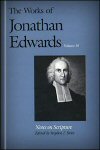
This is the first complete edition of the private biblical notebook that Jonathan Edwards compiled over a period of nearly thirty-five years. Edwards’ "Notes on Scripture" confirms the centrality of the Bible in his thought and provides more balance to earlier depictions of his writings that emphasized the scientific and philosophical while overlooking the biblical dimension. In this critical edition the entries appear in the order in which Edwards wrote them, beginning with a short commentary on Genesis 2:10–14 that he penned in 1724, and ending with his last entry, Number 507 on the Book of Solomon's Song, written two years before his death.
This volume provides direct access to one of America’s most influential religious thinkers. Edwards’ entries range across the entire scriptural canon and reveal his creativity in the interpretation of particular biblical texts and his fascination with typology. The notebook also documents Edwards’ engagement with the intellectual currents of his day, in particular his response to the challenge associated with the Enlightenment critique of biblical revelation. Stephen J. Stein’s introduction situates Edwards as an exegete in the larger tradition of biblical commentary and in the intellectual world of eighteenth-century Western thought.
Edwards scholars should be grateful for this outstanding contribution to an already legendary series.
—Thomas Templeton Taylor, Church History
. . . this is the most representative selection of Edwards’ sermons in print.
—Gerald R. McDermott, Religious Studies Review
Stephen J. Stein is Chancellors’ Professor of Religious Studies and chair of the Department of Religious Studies at Indiana University.
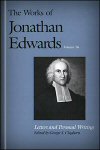
This volume gathers together for the first time all known extant letters of Jonathan Edwards, along with his major personal writings. For more than three decades George S. Claghorn has scoured America, Great Britain, and Scotland for letters and documents by and about Edwards. The result is an unparalleled compendium of 235 letters—including 116 never before published or never reprinted since Edwards’ death—and four autobiographical texts—Edwards’ meditation "On Sarah Pierpont," his future wife, and "Diary," "Resolutions," and "Personal Narrative."
These letters and personal writings reveal the private man behind the treatises and sermons. They trace his relations with parents, siblings, college classmates, friends, and family, as well as with political, religious, and educational leaders of his day. New documents include Edwards’ only known statement on slavery and letters on the Indian mission at Stockbridge, Massachusetts, that display Edwards’ interest in Native Americans and his efforts on their behalf. These writings show the human face of Edwards as he applied theological and philosophical insights to the events of his daily life. They provide an unprecedented resource for understanding the man, his times, and his personal connections.
An excellent resource for both Edwards scholars and more generally for students of eighteenth-century New England and its religious contacts across the North Atlantic world.
—M. A. Smith, Ecclesiastical History
This volume gathers together for the first time all of Edwards' known extant letters, including 116 never before published, as well as his only known statement on slavery and letters on the Indian mission at Stockbridge, Massachusetts. . . . This edition reveals the private man behind the treatises and sermons and traces Edwards' relations with parents, siblings, friends, and the leaders of colonial New England society.
—Mark A. Mastromarino, Documentary Editing
This is truly 'an unprecedented resource' for new and enriched understanding of Edwards. While Edwards has been appreciated for his genius through his readily available treatises and sermons, a portrait of Edwards emerges from these pages that exposes a private, human, many-faceted personality.
—Wayne Hansen, Church History
George S. Claghorn was Professor of Philosophy at West Chester University.
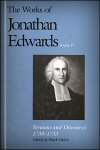
In his new role as pastor of the Northampton church, Jonathan Edwards turned his attention to the political, social, and economic activities of his congregation, shaping his preaching to the day-to-day occurrences in their lives. This volume contains eighteen sermons that Edwards composed in Northampton from the beginning of 1730 through mid-September 1733—such classics as God Glorified in Man’s Dependence and A Divine and Supernatural Light, along with many previously unpublished works. The selections illuminate Edwards’ development as a preacher and theologian. They also provide unique insights into the development of the themes that came to characterize his mature evangelical thinking: the viciousness of the unregenerate life, the importance of evangelical humiliation as a religious exercise, and the necessity of a radical conversion from worldliness to godliness.
The prolific period encompassed by this volume, though outwardly quiet, was crucial to Edwards’ maturation. Taking on the responsibilities of his calling—working with his congregation, finding his voice as a town religious leader, exercising moral and spiritual guidance, consulting with other pastors, and most of all developing a mature preaching style—Edwards came to see revival as the only solution to the social and moral ills of his time.
"This volume will help solidify an emerging new view of Edwards as a theologian with feet in both Enlightenment and awakening, scanning both church and society for signs of redemption. Valeri’s sermon titles are delightful . . . and his introductions insightful.
—Gerald R. McDermott, Religious Studies Review
Valeri has introduced each sermon by outlining its content, and by linking it to its historical setting and Edwards’ other writings. He has also provided a detailed general index and a biblical reference index. I highly recommend this volume to Edwardsean scholars, collectors, and to all librarians. For those interested in reading puritan, evangelical sermons, Edwards is one of the last but also one of the best of that genre.
—Barry Howson, ARC Journal of Faculty of Religious Studies, McGill
Mark Valeri is Ernest Trice Thompson Professor of Church History at Union Theological Seminary in Virginia.
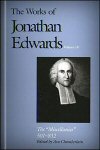
Throughout his ministerial career, Jonathan Edwards filled a series of private notebooks with writings on a wide variety of theological topics, numbering his entries—some 1,400 of them—in sequence. This book, the second of four volumes devoted to these “Miscellanies,” contains entries written during the decade of the 1730s, from July 1731 to approximately January 1740, the eve of the Great Awakening. They record the development of Edwards’ thought as he first emerged as a public spokesperson for orthodox Calvinism, assumed a leadership role in colonial New England church politics, and acquired an international reputation as an evangelist for his role in the revivals in the Connecticut River Valley of 1734 and 1735.
Edwards used the “Miscellanies” as a repository for ideas that he intended to develop in future sermons and treatises, and these entries contain the seeds of such contemporaneous works as Justification by Faith Alone and The History of the Work of Redemption. These entries also record how the Connecticut Valley revivals influenced Edwards’ thoughts on such important theological topics as the significance of perseverance, the nature of spiritual knowledge, justification by faith alone, the rationality of the Christian religion, the history of the work of redemption, and conversion and the religious life.
This volume of Edward’s ‘private notebooks,’ containing entries from 1733 to 1740, chronicles his sustained barrages against deism, which he considered Christianity’s most insidious enemy. . . . These entries will help historians sort out Edward’s views on justification, which have yet to be decisively assessed. They show that Edwards grounded justification in ontological union between Christ and the believer and put increasing emphasis on perseverance.
—Religious Studies Review
Students, pastors, and scholars alike would do well to acquire this volume, along with the others in the Yale series. . . . Chamberlain’s careful presentation of Edwards’ Miscellany entries 501–832, along with her insightful introduction, make this volume a welcome new edition to the series and one worthy of consideration.
—Stephen J. Nichols, Westminster Theological Journal
Ava Chamberlain is Assistant Professor of Religion at Wright State University.
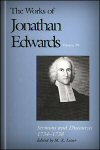
Jonathan Edwards achieved the greatest sustained mastery of the sermon form between January 1734 and December 1738—a time in which he also kindled his first revival. The Northampton revival spread to neighboring towns and villages, as did Edwards’ renown. And the sermons of these years exhibit not only splendid rhetoric but also figural intricacies and tonal nuances that reveal his maturity as a writer.
During this period Edwards delivered probably four hundred sermons and lectures. Of the fewer than half that survive, some extend the reach of the previous dozen years of his ministry, others engage speculative theological issues, others touch on pastoral life, and still others deal with conversion and, in time, declension. Edwards also wrote a full account of the Northampton revival, A Faithful Narrative of the Surprising Work of God, which was published in 1737 in London and Edinburgh and within a year was reprinted there, issued in Boston in three printings, and translated into German. In addition, near the end of the period Edwards put together Discourses on Various Important Subjects, five sermons about the Awakening and the only gathering of sermons he saw through the press.
M. X. Lesser is Emeritus Professor of English at Northeastern University.
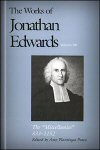
Throughout his adult life Jonathan Edwards kept a series of personal theological notebooks on a wide variety of miscellaneous subjects. This volume includes the notebook entries written during the eventful and tumultuous years 1740–1751, when Edwards was plagued by a series of bitter controversies with his Northampton congregation that culminated in his dismissal. This was also the period during which he witnessed, documented, and pondered the surprising revivals of the Great Awakening, as well as their precipitous decline.
The notebook entries chronicle Edwards' continuing fascination with the nature of saving faith and with faith's culmination in the glories of heaven and the torments of hell. They also reflect his keen interest in defending Christianity's reasonableness from enemies at home and abroad. A new theme emerges as Edwards expresses a growing sense of the deist threat and in numerous entries defends Christian doctrines by showing striking similarities between Christian orthodoxy and ancient "heathen" philosophy. Finally, the entries show the development of Edwards' thinking on the topics of the great treatises he would come to write during his years in Stockbridge.
Amy Plantinga Pauw is Henry P. Mobley, Jr. Professor of Doctrinal Theology, Louisville Presbyterian Seminary.
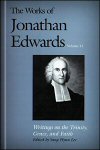
In this collection of writings drawn from Jonathan Edwards’ essays and topical notebooks, the great American theologian deals with key Christian doctrines including the Trinity, grace, and faith. The volume includes long-established pieces in the Edwards canon, newly reedited from the original manuscripts, as well as documents that have never before been published and that in some cases reveal new aspects of his theology.
[Editor] Sang Hyun Lee . . . has placed us all in his debt, not only by ably editing this volume, but also by providing a most thorough and insightful introduction.
—Iain S. Maclean, Anglican Theological Review
Sang Hyun Lee is Kyung-Chik Han Professor of Systematic Theology at Princeton Theological Seminary.
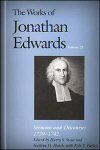
The sermons and discourses in this volume chart the rise and decline of the Great Awakening in Jonathan Edwards’ parish in Northampton, Massachusetts, and beyond. A leading figure of the revival period, Edwards delivered potent and wide-ranging sermons during the years 1739–42. In this volume the transcript of the original manuscript of Sinners in the Hands of an Angry God is reproduced for the first time, along with the text of its first printed edition.
Seeking to nourish the emerging revival spirit, Edwards preached on the glory of saints in heaven, the dangers and opportunities of the unregenerate on earth, and the torment of the damned and devils in hell. As the revival progressed he became ever more critical of participants' behavior, and with its decline he attempted—without success—to compel godliness.
This volume’s introduction is one of the best short guides to Edwards’ view of history. With dramatic and vivid prose that is reminiscent of the best of Perry Miller, Stout sketches Edwards’ substitution of history for theology as queen of the sciences, recasting systematic theology in the form of a history of redemption. Recommended for all libraries.
—Gerald R. McDermott, Religious Studies Review
Harry S. Stout is Jonathan Edwards Professor of American Christianity at Yale University and General Editor of The Works of Jonathan Edwards.
Nathan O. Hatch is President of Wake Forest University.
Kyle P. Farley is Dean of Jonathan Edwards College, Yale University.
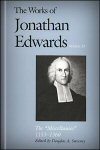
Throughout his ministerial career, Jonathan Edwards filled a series of private notebooks on a wide variety of theological topics, numbering his entries—nearly 1,400 of them—in sequence. With the publication of this, the fourth and final volume of miscellanies, readers have access for the first time to the most comprehensive printed edition of Edwards' "Miscellanies," the most controversial and commonly cited of his sets of private notebooks and his most sustained, serious effort to rough out his theological reflections. Edwards began the nine-book series in 1722, while still in his late teens, and added to it throughout his last thirty-five prolific years. As one who thought "with his pen in his hand," he used these intellectual workbooks to extend and clarify his ideas about an exceptionally wide range of issues and themes.
The entries in this volume cover the years from 1751 to 1758, a period during which Edwards faced a variety of difficult challenges while working at the Stockbridge Indian mission and served a short-lived presidency at Princeton, then known as the College of New Jersey. In these entries Edwards grapples with modern naturalism, critiques "generous doctrines," and attempts to bolster Reformed thought in the face of the Enlightenment. Through his meditations and argumentations, as well as his engagement with some of the chief religious and philosophical figures of the age, Edwards emerges as a thinker determined to put reason at the service of revelation.
The excellent index as well as the outstanding tour presented in the editor's introduction will allow any Edwards-enthusiast access to the prominent themes contained in these entries. . . . This volume is an excellent resource for Edwards specialists and historians of American Christianity and American theology. Non-specialist fans of Edwards who wish to take their understanding of this New England pastor to a deeper level will enjoy this glimpse into his personal studies. Douglas Sweeney's introductory essay superbly contextualizes Edwards' notes, providing a biography of this period, a survey of Edwards' main interlocutors, and a summary of the prominent themes throughout the notes. I highly recommend this volume.
—Robert W. Caldwell III, Southwestern Journal of Theology
Douglas A. Sweeney Professor of Church History and the History of Christian Thought at Trinity Evangelical Divinity School
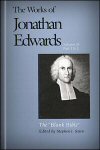
In 1730, Jonathan Edwards acquired a book-like, leather-bound manuscript containing an interleaved printed edition of the King James Version of the Bible. Over the next three decades, Edwards proceeded to write in the manuscript more than five thousand notes and entries relating to biblical texts (though paradoxically he called the manuscript his “Blank Bible”). Only a fraction of the entries has ever been published. This volume presents a complete edition of the “Blank Bible” accompanied by an informative introduction, multiple appendices, and an extensive index.
This volume, perhaps the most unusual in Edwards’ oeuvre, brings to light more clearly than ever before the full scope of his creative investment in biblical studies.
Stephen J. Stein is Emeritus Chancellor’s Professor in the Department of Religious Studies, Indiana University, Bloomington. He is the editor of two previous volumes in The Works of Jonathan Edwards: Apocalyptic Writings and Notes on Scripture.
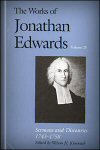
This wide-ranging volume covers the final fifteen of the thirty-three years that Jonathan Edwards preached and includes some of his greatest sermons—including his "Farewell Sermons" to his Northampton congregation. The period is defined by Edwards' inventive strategies to improvise during the delivery of his sermons. Considering dependence on the written text in the pulpit to be a serious failing, he devised a double-columned, outlined format for his sermon manuscripts and continued to use it for the rest of his life. Sermons from this period also include those preached to Mohican and Mohawk Indians at the mission post of Stockbridge, Massachusetts.
Edwards’ various writings of 1743–58 map the complex terrain of his spiritual, intellectual, and professional life after the Great Awakening. He deals with topics ranging from the spiritual role of youth in the community to the struggles over communion in his Northampton congregation to the war with the French and their Indian allies.
Wilson H. Kimnach is the general editor of the Jonathan Edwards sermon series in The Works of Jonathan Edwards and coeditor of The Sermons of Jonathan Edwards: A Reader. He is Presidential Professor in the Humanities at the University of Bridgeport and lives in Woodbridge, CT.
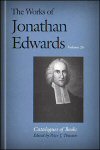
This final volume in The Works of Jonathan Edwards publishes for the first time Edwards’ “Catalogue,” a notebook he kept of books of interest, especially titles he hoped to acquire, and entries from his “Account Book,” a ledger in which he noted books loaned to family, parishioners, and fellow clergy. These two records, along with several shorter documents presented in the volume, illuminate Edwards’ own mental universe while also providing a remarkable window into the wider intellectual and print cultures of the eighteenth-century British Atlantic. An extensive critical introduction places Edwards’ book lists in the contexts that shaped his reading agenda, and the result is the most comprehensive treatment yet of his reading and of the fascinating peculiarities of his time and place.
The conclusion of one of the great editorial projects in American letters, not to mention American religion. . . . Although an edition of Edwards' reading lists—his 'Catalogues of Books'—may seem to bear as much potential for excitement as my collected fifth-grade spelling-papers, what Peter Thuesen's treatment of the 720 entries in the Catalogue offers us is a geography of the mind of Jonathan Edwards. It is a superb example of the scholarly editor's work, a major contribution to the intellectual history of the eighteenth century, and an indispensable adjunct to any understanding of Edwards' life as a theologian and philosopher. . . . The Catalogue is a revelation of an insatiable intellectual curiosity, at a time when a single mind could still aspire to universal knowledge.
—Allen C. Guelzo, Books and Culture
Peter J. Thuesen is Associate Professor of Religious Studies at Indiana University–Purdue University Indianapolis.
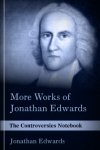
More Works of Jonathan Edwards: The Controversies Notebook
- Author: Jonathan Edwards
- Publisher: Yale University Press
- Publication Date: 2015
- Pages: 422
Throughout his life, Jonathan Edwards was a copious note-taker. Beginning in the 1730s, he collected his many notes on contentious theological subjects in a definitive “Controversies Notebooks.” Covering everything from the doctrine of original sin to the nature of true virtue, many of these entries would later be developed into full-blown treatises. This edition is complete with Edwards’ marginal notes and redactions, providing unique insight into the thought development of a theological giant.
- Original Sin
- Justification
- Regeneration
- Universal Redemption
- Saving Grace Differs from Common Grace
- Foreknowledge of God
- Efficacious Grace
- Nature of True Virtue
- Importance of Doctrines
- Future Punishment of the Ungodly
- Predestination
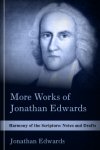
More Works of Jonathan Edwards: Harmony of the Scripture: Notes and Drafts
- Author: Jonathan Edwards
- Publisher: Yale University Press
- Publication Date: 2015
- Pages: 724
When Jonathan Edwards was tapped by the College of New Jersey to become its next president, he cited numerous reasons why it was a bad idea. Chief among them: a “great work” that would occupy his time for years to come. His proposed magnum opus—Harmony of the Scripture—never came to fruition, but the very idea has tantalized Edwards fans for generations.
The preparatory notes and drafts for Harmony of the Scripture provide a glimpse into what could have been. As evidenced in this volume, the Harmony would have detailed the Old Testament prophecies of Christ and their fulfillment, explored the rich typology of the Old Testament and their New Testament antitypes, and synthesised the teaching of the Old and New Testaments. This volume represents an unprecedented opportunity to explore ideas that Edwards clearly held dear, but never had the opportunity to fully develop.
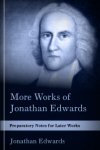
More Works of Jonathan Edwards: Preparatory Notes for Later Works
- Author: Jonathan Edwards
- Publisher: Yale University Press
- Publication Date: 2015
- Pages: 102
Jonathan Edwards’ writing process began with an extensive planning phase wherein he scribbled everything from fleeting thoughts to extensive commentary and in-depth arguments in his many notebooks. Later, he’d develop these seminal thoughts into the profound and refined discourses that have made him one of the most influential theologians in history. In this selection of preparatory notes for later works, we find Edwards nurturing the seeds of some of his greatest treatises—including Religious Affections—as well as works that never came to be.
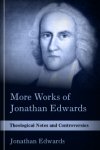
More Works of Jonathan Edwards: Theological Notes and Controversies
- Author: Jonathan Edwards
- Publisher: Yale University Press
- Publication Date: 2015
- Pages: 226
Jonathan Edwards wasn’t just a theologian, he was a pastor at heart. Like any pastor, he encountered his share of controversy, and these notes from those disputes shed light on the ministry and tact of one of history’s greatest churchmen. This selection of notes and papers includes Edwards’ accounts of church discipline cases such as the famous “Bad Book Case” as well as papers written in response to the theological debates of his era.
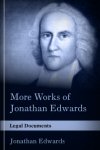
More Works of Jonathan Edwards: Legal Documents
- Author: Jonathan Edwards
- Publisher: Yale University Press
- Publication Date: 2015
- Pages: 50
Whether you’re a Jonathan Edwards scholar, or just a devoted admirer, you’ll appreciate this rare and detailed glimpse into the theologian’s personal life. This sampling includes a copy of Edwards’ personal will and inventory, court documents, and other legal notes and papers.
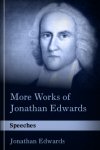
More Works of Jonathan Edwards: Speeches
- Author: Jonathan Edwards
- Publisher: Yale University Press
- Publication Date: 2015
- Pages: 60
Jonathan Edwards was a master of preaching, but his oratory skills didn’t end there. This volume includes two rare speeches delivered by Edwards upon his graduation from Yale in 1723: his valedictory speech, and a paper presented in defense of his masters of arts degree.
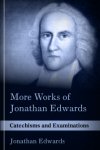
More Works of Jonathan Edwards: Catechisms and Examinations
- Author: Jonathan Edwards
- Publisher: Yale University Press
- Publication Date: 2015
- Pages: 54
This selection of theological questionaires were created by Jonathan Edwards to examine candidates for ministry and teach the Christian faith to young people.
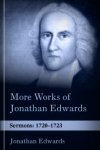
More Works of Jonathan Edwards: Sermons: 1720–1723
- Author: Jonathan Edwards
- Publisher: Yale University Press
- Publication Date: 2015
- Pages: 424
Jonathan Edwards’ sermons were a key influence throughout the Great Awakening and have influenced countless preachers and theologians ever since. This selection of sermons from throughout his career provides a glimpse into a profound and prolific pulpit ministry.
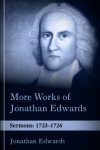
More Works of Jonathan Edwards: Sermons: 1723–1726
- Author: Jonathan Edwards
- Publisher: Yale University Press
- Publication Date: 2015
- Pages: 337
Jonathan Edwards’ sermons were a key influence throughout the Great Awakening and have influenced countless preachers and theologians ever since. This selection of sermons from throughout his career provides a glimpse into a profound and prolific pulpit ministry.
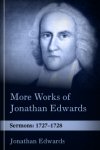
More Works of Jonathan Edwards: Sermons: 1727–1728
- Author: Jonathan Edwards
- Publisher: Yale University Press
- Publication Date: 2015
- Pages: 646
Jonathan Edwards’ sermons were a key influence throughout the Great Awakening and have influenced countless preachers and theologians ever since. This selection of sermons from throughout his career provides a glimpse into a profound and prolific pulpit ministry.
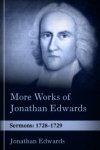
More Works of Jonathan Edwards: Sermons: 1728–1729
- Author: Jonathan Edwards
- Publisher: Yale University Press
- Publication Date: 2015
- Pages: 787
Jonathan Edwards’ sermons were a key influence throughout the Great Awakening and have influenced countless preachers and theologians ever since. This selection of sermons from throughout his career provides a glimpse into a profound and prolific pulpit ministry.
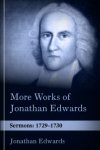
More Works of Jonathan Edwards: Sermons: 1729–1730
- Author: Jonathan Edwards
- Publisher: Yale University Press
- Publication Date: 2015
- Pages: 1120
Jonathan Edwards’ sermons were a key influence throughout the Great Awakening and have influenced countless preachers and theologians ever since. This selection of sermons from throughout his career provides a glimpse into a profound and prolific pulpit ministry.
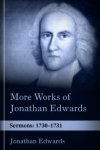
More Works of Jonathan Edwards: Sermons: 1730–1731
- Author: Jonathan Edwards
- Publisher: Yale University Press
- Publication Date: 2015
- Pages: 887
Jonathan Edwards’ sermons were a key influence throughout the Great Awakening and have influenced countless preachers and theologians ever since. This selection of sermons from throughout his career provides a glimpse into a profound and prolific pulpit ministry.
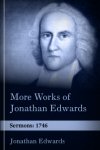
More Works of Jonathan Edwards: Sermons: 1746
- Author: Jonathan Edwards
- Publisher: Yale University Press
- Publication Date: 2015
- Pages: 754
Jonathan Edwards’ sermons were a key influence throughout the Great Awakening and have influenced countless preachers and theologians ever since. This selection of sermons from throughout his career provides a glimpse into a profound and prolific pulpit ministry.
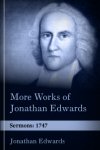
More Works of Jonathan Edwards: Sermons: 1747
- Author: Jonathan Edwards
- Publisher: Yale University Press
- Publication Date: 2015
- Pages: 638
Jonathan Edwards’ sermons were a key influence throughout the Great Awakening and have influenced countless preachers and theologians ever since. This selection of sermons from throughout his career provides a glimpse into a profound and prolific pulpit ministry.
Jonathan Edwards (1703–1758) is considered one of America’s greatest theologians. While attending Yale College, he encountered the same Calvinism that had influenced his own upbringing.
The First Great Awakening began in Edwards’ church three years later, which prompted Edwards to study conversion and revival within the context of Calvinism. During the revival, Edwards preached his most famous sermon, “Sinners in the Hands of an Angry God,” and penned many of his most popular works, including The Distinguishing Marks of a Work of the Spirit of God, A Treatise Concerning Religious Affections, and The Life of David Brainerd.
When the revival subsided, the church of Northampton became increasingly suspect of Edwards’ strict requirements for participation in the sacraments. Edwards left Northampton in 1750 to become a minister at a missions church in Stockbridge, Massachusetts. In 1757, Edwards reluctantly became president of the College of New Jersey (Princeton University), where he hoped to complete two major works—one that expanded his treatise on the history of redemption, and the other on the harmony of the Old and New Testaments. His writing ambitions were interrupted by his death in 1758, when he died of complications stemming from a smallpox inoculation.
Reviews
3 ratings

Martijn
11/1/2022
Norman sanders
3/26/2022
Jordan
11/8/2020